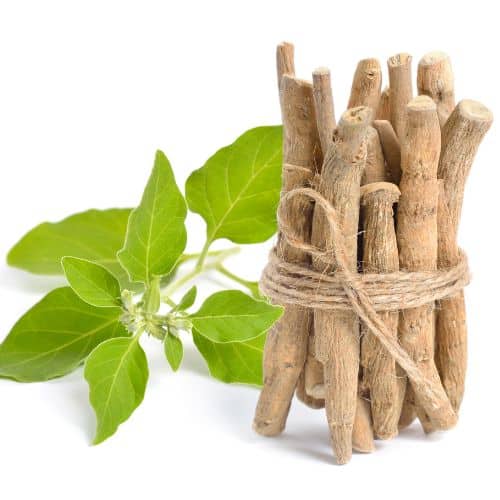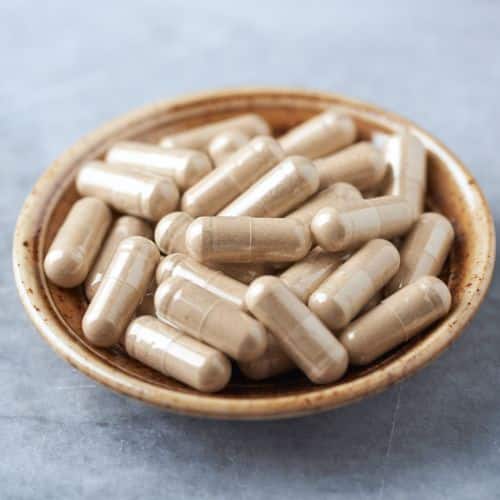Ashwagandha for Menopause: Weighing the Pros & Cons
A popular herb being explored for menopause is ashwagandha. But are the claims legit? Can ashwagandha actually help with menopause relief? Most likely, yes – but the evidence-based research on ashwagandha for menopause specifically is sparse at this time.
Table of Contents
ToggleStill, it’s looking promising. There are lots of reasons why we should trust the ancient wisdom of Ayurveda (a type of holistic lifestyle medicine from ancient India dating back over 6,000 years) when it comes to ashwagandha for menopause symptom relief.
In this article, we’ll unpack the potential benefits and risks/contraindications of taking ashwagandha for menopause, according to a holistic registered dietitian and clinical herbalist!
Disclaimer: This article was written for educational purposes only, not to replace customized medical and nutritional advice from qualified health professionals. Make sure to consult your treatment team for customized advice about ashwagandha for menopause!
What Is Ashwagandha?

Ashwagandha (Withania somnifera) is a medicinal shrub that originates in ancient India and Ayurvedic medicine. It is now cultivated worldwide due to its renowned health benefits.
In Indian sanskrit, the word “ashwagandha” quite literally translates to “smell of a horse” since it smells like a horse. It has been said to give us the strength and stamina of a horse.
Ashwagandha root is categorized as an adaptogenic herb – meaning it works synergistically with your body to balance your stress response and immune system.
In Ayurvedic herbal medicine, ashwagandha is also said to be a “Rasayana” in that it may help boost our vitality, or life-force energy, and enhance overall well-being.
How It Works
Ashwagandha root extract seems to exhibit the following actions in our mind/body:
- Antioxidant (protects against free radical cell damage)
- Reduces morning cortisol levels
- Activates Nrf2, protecting cells from damage
- Acts as a nervine (restorative to the nervous system)
- Raises thyroid hormone T3 and T4 levels
- Alters GABAergic and serotonergic pathways
While there’s more going on behind the scenes, this summary helps us to understand better why and how it works.
Common Uses
General
For thousands of years, ashwagandha root has been used for each the following:
- Aphrodisiac
- Antioxidant
- Anthelmintic (anti-parasitic)
- Adaptogen (immune modulator)
- Narcotic
- Adrenal tonic
- Diuretic
- Stimulant
- Thyroid-stimulating
Menopause-Specific
Many women going through menopause/perimenopause are now exploring the benefits of ashwagandha for the following unwanted symptoms:
- Insomnia
- Anxiety
- Hot flashes
- Weight gain
- Fatigue
- Hormonal imbalance
- Low libido
Research-Backed Benefits
May Help Reduce Menopausal Symptoms
To date, unfortunately, there’s only been one evidence-based research study investigating the potential benefits of taking ashwagandha for menopause.
This research study concluded that ashwagandha root extract could be a safe and effective option for relieving mild to moderate climacteric symptoms during perimenopause.
This study was an 8-week randomized, double-blind, placebo-controlled study conducted in 2021 among 100 women. The results were published in the Journal of Obstetrics and gynecological research.
The results of this study were based on the following criteria, which were measured before and after the 8 weeks of taking either ashwagandha root extract or a placebo:
- A menopause rating scale (MRS)
- Menopause-specific quality of life
- Hot flash scores
- Hormonal changes in estradiol, follicle-stimulating hormone (FSH), luteinizing hormone (LH), and testosterone
But for now, we can lean more into the studies which support claims around ashwagandha for helping with various types of general symptoms that happen to also occur during menopause.
Helps Reduce Stress and Anxiety
While everyone experiences stress and anxiety, these feelings can most definitely become amplified during menopause.

Fortunately, ashwagandha can make a wonderful ally for anyone if you’re looking for something natural to “help take the edge off” during times of stress.
According to a 2021 review by Current Neuropharmacology, after investigating multiple reports of human and animal trials, the final verdict was that ashwagandha root and leaf extracts “exhibited noteworthy anti-stress and anti-anxiety activity.”
This claim was further supported in a 2022 meta-analysis, which concluded that a dose of ~300-600 milligrams per day of ashwagandha root was enough to reduce anxiety and stress among participants.
May Help Improve Sleep
There’s nothing worse than tossing and turning throughout the night, unable to fall asleep (or stay asleep)!
While research is lacking on menopause-specific insomnia, ashwagandha might still be worth trying if you suffer from insomnia as a symptom of perimenopause.
Ashwagandha was found to improve insomnia according to a 2021 review which investigated the roles of ashwagandha for anxiety and depression.
The benefits of ashwagandha for supporting sleep and reducing insomnia were further supported in a 2021 meta-analysis and a 2022 randomized control trial.
May Help Combat Fatigue

In a 2022 randomized control trial, college students reported significant improvements in perceived energy levels and sleep quality after taking 700 milligrams of ashwagandha for 30 days.
Since we also know that fatigue is a common symptom of hypothyroidism, ashwagandha may indirectly increase energy levels among those with suboptimal thyroid function.
May Support Weight Loss Efforts
Weight gain and reduced metabolism are common complaints in early menopause.
While we don’t have any research on the role of ashwagandha in menopausal weight management, we still have some interesting data worth exploring!
Aside from increasing thyroid hormone production, which can indirectly increase metabolic rate, we know that ashwagandha is high in potent antioxidants.
So how do antioxidants in ashwagandha translate to weight loss?
According to a 2022 study by Nutrients, the antioxidant activity in ashwagandha may help increase and enhance metabolism at the cellular level by improving mitochondrial function – specifically in adipose tissue and muscle cells.
A dose of 300 milligrams of ashwagandha root extract twice daily was also concluded to be effective as an ally for “body weight management in adults under chronic stress”, in a 2017 double-blind, randomized, placebo-controlled clinical trial.
(Still, there is no supplementing an unhealthy diet! Ashwagandha should never be taken in place of healthy, balanced food choices and regular exercise.)
May Help Increase Libido
Whether you’re going through the early stages of perimenopause or years into life as a postmenopausal woman, consider trying ashwagandha to help boost and enhance your libido!
This was supported in a 2022 Cureus study which found that just 300 milligrams of ashwagandha root extract twice daily was enough to make significant differences in libido for a group of healthy females.
We need more research to further investigate this potential benefit – specifically in menopausal women, but it’s generally safe in most cases.
(Still, make sure to consult your doctor before giving ashwagandha a try!)
Risks, Side Effects, and Contraindications
While ashwagandha is generally safe, effective, and well-tolerated for most people, there are always exceptions. (One size never fits all!)
Possible Side Effects
Some uncommon-but-possible side effects of taking ashwagandha (as reported in research studies and in my clinical practice) can include:
- Nausea
- Drowsiness
- Diarrhea (reported anecdotally by several clients in my private functional nutrition practice)
Clinical Contraindications
Avoid ashwagandha or consult a doctor if you have grave’s disease and/or are taking any of the following medications:
- Thyroid-altering medication
- Hormone replacement
- Birth control/contraceptives
- Immune-suppressing medication
- Blood sugar-altering medication
- Blood pressure-altering medication
- Anticonvulsant medication
- Sedatives
Ashwagandha is also in the nightshade family. Avoid ashwagandha if you have (or suspect) a nightshade sensitivity.
It’s also advised to avoid ashwagandha if you are preparing for surgery within a few days.
Additional Risks and Safety Concerns
As a friendly reminder, the supplement industry is largely unregulated.
Go organic whenever possible, and make sure to order directly from the herb store, (Don’t buy ashwagandha through Amazon, eBay, or other third-party sellers!)
While this most likely will not be relevant if you’re going through menopause, it needs to be said, just in case: don’t take ashwagandha during pregnancy or breastfeeding. 😉
Taking Ashwagandha for Menopause: FAQs
How much should you take?
The research studies cited in this article show that a dose of between 300 milligrams to 1200 milligrams per day of ashwagandha is generally safe and effective for managing the various symptoms of menopause, such as anxiety, insomnia, low libido, hot flashes and/or hormonal imbalance.
Still, make sure to consult a healthcare professional to receive customized guidance tailored to your individual needs since one size never fits all!
What’s the best delivery method?
Extracted Capsules

You can take ashwagandha root in capsule form, as long as it has been pre-extracted. (This is something that would be noted in the nutrition facts label.)
The number of capsules to take will depend on the amount of ashwagandha extract contained within each capsule.
Herbal tinctures
For those who don’t enjoy swallowing pills, you can also take ashwagandha in the form of an herbal tincture – aka an alcohol extract of the herb.
- In this case, you can take it in a drop dose – so about ~30 to 45 droplets, 1 to 4x daily.
Ashwagandha-infused ghee
In Ayurvedic herbal medicine, ashwagandha is traditionally infused into ghee (clarified butter) and used in cooking.
- If you’re interested in exploring this delivery method further, you can try out my favorite ashwagandha-infused ghee here!
Ashwagandha chai tea
Last but not least – for my fellow tea connoisseurs, during the cooler months of the year, you may enjoy blending ashwagandha into an ashwagandha chai tea a few times a day!
(I find it’s too hot to drink this spicy tea consistently during the summer months – but it’s lovely and soothing during the fall and winter.)
The only downside of taking ashwagandha as a tea is that it’s significantly more time-consuming and less convenient compared to the capsules and tincture delivery method. 😉
Where should I buy ashwagandha?
When purchasing ashwagandha, whether it be capsules, tincture, or tea, make sure you’re going with an organic product that has been quality-controlled and third-party tested if possible.
I generally recommend purchasing herbs from organic online apothecaries versus local shops such as Sprouts, Whole Foods or natural food stores, since light degrades potency and these products tend to sit on the shelves in direct light for years.
I also recommend ordering directly from the company website. (A few of my go-to online organic herb stores are Mountain Rose Herbs and Starwest Botanicals!)
Lastly, make sure not to buy supplements from resellers such as on Amazon or eBay, since these sites are not regulated.
The Bottom Line
Taking ashwagandha root extract is most likely effective if you’re looking for natural ways to manage and reduce unwanted symptoms of perimenopause and menopause – specifically anxiety/stress, insomnia, hormonal imbalance, low energy, weight gain, and low libido.
But still, the research is sparse! The jury is still out on whether ashwagandha is a reliable ally specifically for women in menopause.
Quality matters. Not all ashwagandha is created equal! Go with an organic form of ashwagandha root extract (in capsules, tincture, tea, or infused ghee). Purchase from a reputable source.
Make sure you’re staying within the established safe and effective range of ~300 to 1200 milligrams per day, starting with lower doses in case you experience any adverse effects.
It’s also important to remember there is no such thing as a quick-fix or stand-alone solution. Make sure you aren’t neglecting the fundamentals such as a balanced diet, movement, and stress management techniques.
And last but not least, consult with your doctor and a registered dietitian before exploring ashwagandha for menopause relief!
“Ashwagandha for Menopause” was written by holistic registered dietitian and clinical herbalist Jenna Volpe, RDN, LDN, CLT and reviewed & updated by Dr. Su-Nui Escobar, DCB, RDN, registered dietitian and doctor in clinical nutrition.
More resources
To learn more about natural relief for menopause, feel free to check out the following articles:
- Is Omega-3 Good for Menopause?
- Supplements for Menopause Joint Pain
- 11 Superfoods for Menopause
- Maca for Menopause: Can it Alleviate Symptoms?

Dr. Su-Nui Escobar, a Registered Dietitian/Nutritionist in Miami, FL, is dedicated to empowering women in perimenopause and menopause to live healthier, more satisfying lives.
With a doctorate in clinical nutrition from the University of North Florida, she has expertise in menopause and weight loss, including the unique challenges faced by those on weight loss medications.
Su-Nui’s passion for her field is evident in her previous role as the Academy of Nutrition and Dietetics spokesperson.


